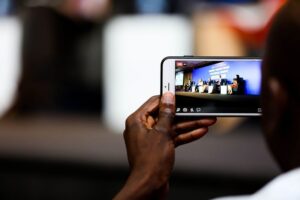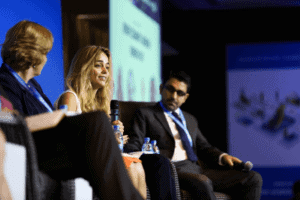New technology, new players, new approaches—the past few years have been marked with the disruption of nearly every industry around the world. Financial inclusion is no exception and a tension amidst all this newness has been brewing.
Women’s World Banking CEO Mary Ellen Iskenderian touched on this tension when she lightheartedly prepared the audience for “hints of conflict” at the opening plenary of Making Finance Work for Women Summit in Dar es Salaam, Tanzania.

Their conversation teed up what would be a predominant theme of the two-day event: the perceived clash between traditional and new financial service providers is giving way to collaboration as all players recognize their critical and interconnected roles in advancing women’s financial inclusion.
Financial inclusion to what end?
Financial inclusion conversations often focus on women’s access to savings, credit, and insurance. Today, Mark Napier pointed out, financial service providers need to look beyond access and focus on the “utility of finance” and how useful the products are to women. “Let’s talk more about land and housing, that’s what women want finance for, not just a savings account,” said Mark.
Who’s customer?
Digital financial services (DFS) provide low-income women with the proximity, security, and convenience they need in a financial service. Banks are partnering with mobile network operators (MNOs) and FinTech companies to deliver these solutions. But these partnerships can open debate over who the customer belongs to.
NMB’s Ineke Bussemaker thinks there is room, and indeed a need, for both. Banks can reach financial inclusion in terms of access, but it takes partnership with MNOs to reach financial inclusion in terms of usage.
The proof is in her own market. Over the past decade, with the emergence of MNOs and mobile wallets, Tanzania has witnessed the percentage of adults age 16 and over with access to a bank account grow from 15 percent to roughly 70 percent… if MNO services are included.
“Financial inclusion, if you limit it to banks, is still not very high,” said Ineke.
Why MFIs still matter

“What MFIs have in their DNA, and what is important to maintain – is that when things are moving quickly, we have a responsibility to make sure that we are doing things in the clients’ best interest,” said Muna.
Rookies taking on risk
Hassan Mahbub of JazzCash responded to Muna’s concerns about responsibility. He pointed out that private sectors companies are taking on a lot of risk in delivering products and spurring competition. Traditional banks would not have done so.
Jazz is largest MNO in Pakistan, and has been operating for over 20 years. A few years ago, it introduced its mobile wallet, JazzCash, which today serves 14 million customers. Hassan claims JazzCash is creating new opportunities in Pakistan, where 40 banks serve only 12 percent of the country’s 200 million population; and where less than 1 percent of those customers have access to loans. Hasaan explained the banks don’t lend to consumers because the costs are too high.
“Not just bad debt, but also the due processes, credit checks, to verify the customer – it takes too much time,” said Hassan. “If telcos and banks can collaborate to build credit scores based on mobile phone usage, and if they offer that to the banks, that would ease our processes completely.”
Why women?
“Women largely do not have access to financial services. The complicated social and cultural norms in Pakistan dictate their lives differently,” said Hasan.
Hasan said Jazz saw an opportunity in the untapped women’s market in Pakistan, not just for the overall good of empowering women, but also in commercial terms. Today, they are working with Women’s World Banking to address one of the key barriers to improving their women customer base: the lack of female agents in Pakistan. With Women’s World Banking’s support, Jazz is partnering with Unilever to onboard female retailers in the value chain as JazzCash agents.
For NMB, the focus is dual. Ineke explained that yes, serving women customers will bring additional profitability, but so will having women managers across the organization.
“We’re not promoting gender parity at all levels because we feel otherwise it’s unfair to women. We are promoting it because we feel it makes business sense,” said Ineke. “When you empower women, you empower 50 percent of our economy. That’s the business case.”
Among most of the 350 participants, there is excitement at the entry of and partnership with new and innovative players who together, are accelerating women’s financial inclusion.



